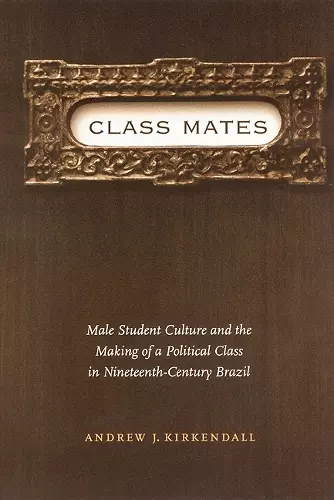Class Mates
Male Student Culture and the Making of a Political Class in Nineteenth-Century Brazil
Format:Paperback
Publisher:University of Nebraska Press
Published:1st Mar '02
Currently unavailable, and unfortunately no date known when it will be back

This innovative study considers how approximately seven thousand male graduates of law came to understand themselves as having a legitimate claim to authority over nineteenth-century Brazilian society during their transition from boyhood to manhood.
While pursuing their traditional studies at Brazil's two law schools, the students devoted much of their energies to theater and literature in an effort to improve their powers of public speaking and written persuasion. These newly minted lawyers quickly became the magistrates, bureaucrats, local and national politicians, diplomats, and cabinet members who would rule Brazil until the fall of the monarchy in 1889.
Andrew J. Kirkendall examines the meaning of liberalism for a slave society, the tension between systems of patriarchy and patronage, and the link between language and power in a largely illiterate society. In the interplay between identity and state formation, he explores the processes of socialization that helped Brazil achieve a greater measure of political stability than any other Latin American country.
"In this thoughtful monograph, Andrew Kirkendall provides an ambitious rereading of some of the classic themes of the post-Independence of Brazil, as well as a careful revision of the historiography on his principal subject: the law schools of Sao Paulo and Olinda... Far from a simple institutional history of these bastions of higher education, Kirkendall's work is instead a sweeping treatment of the production and evolution of a political class during the Brazilian Empire."-Roger Kittleson, The Americas -- Roger Kittleson The Americas "Kirkendall makes the important contribution of showing the process by which the political class was formed. That process and its interaction with the development of a Brazilian national identity make very provocative reading and should be of comparative interest to historians in other areas. This book will be excellent for graduate seminars as well as scholars in general."-Elizabeth A. Kuznesof, The American Historical Review -- Elizabeth A. Kuznesof The American Historical Review "This engaging little book speaks to several important issues in Brazilian history."-Hendrik Kraay, Journal of Latin American Studies -- Henrik Kraay Journal of Latin American Studies
ISBN: 9780803278042
Dimensions: unknown
Weight: 386g
270 pages